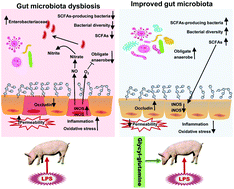Dietary glycyl-glutamine supplementation ameliorates intestinal integrity, inflammatory response, and oxidative status in association with the gut microbiota in LPS-challenged piglets†
Abstract
During weaning transition, mammalian newborns suffer severe enteric infections and thus induced gut microbiota dysbiosis, which in turn aggravates enteric disorder. The synthetic dipeptide glycyl-glutamine (GlyGln) has been used as a diet supplement to improve the weaning transition of newborns. However, the effect of dietary GlyGln supplementation on the gut microbiota of piglets with enteric infection remains unclear. Here, weaned piglets received a basal diet or a basal diet supplemented with 0.25% GlyGln for 3 weeks. Five piglets in each group received an intraperitoneal injection of lipopolysaccharide (LPS) (100 μg per kg BW) (LPS and GlyGln + LPS groups) and meanwhile five piglets in a control group received an intraperitoneal injection of saline (Ctrl group). The results showed that dietary GlyGln supplementation improved the LPS induced inflammation response and damage to the ileum morphology by increasing interleukin 10, tight junction proteins, villus height, and the ratio villus height/crypt depth, but decreasing the crypt depth. For the oxidative status, dietary GlyGln supplementation increased the ileal superoxide dismutase and meanwhile reduced the malondialdehyde and nitric oxide synthase activity (NOS) (total NOS and inducible NOS), compared with that in the LPS group. LPS challenge reduced the diversity of gut microbiota and enriched the facultative anaerobic Escherichia coli. The GlyGln restored alpha diversity and the structure of the gut microbiota by enriching obligate anaerobes and short-chain fatty acid (SCFA)-producing bacteria, including Clostridium, Lachnospira, Phascolarctobacterium, Roseburia, Lachnospiraceae, and Synergistetes. GlyGln enriched the gut microbiota function of carbohydrate metabolism and elevated the ileal SCFA concentrations of propionic acid and butyric acid that had been decreased by the LPS challenge. The beneficial effects of dietary GlyGln supplementation are closely associated with its enriched bacteria and SCFAs. Taken together, dietary GlyGln supplementation improved the gut microbiota dysbiosis induced by LPS challenge and enriched obligate anaerobes and SCFA-producing bacteria, which contributed to the amelioration of intestinal integrity, inflammatory responses, and oxidative status.



 Please wait while we load your content...
Please wait while we load your content...